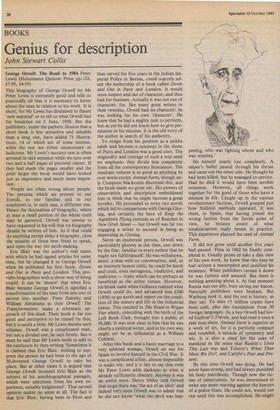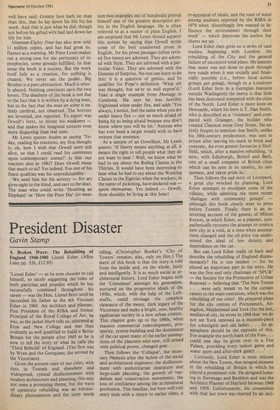BOOKS
Genius for description
John Stewart Collis
George Orwell: The Road to 1984 Peter Lewis (Heinemann Quixote Press pp.' 22, £7.95, £4.95) This biography of George Orwell by Mr Peter Lewis is extremely good and tells us practically all that it is necessary to know about the man in relation to his work. It is short, for Mr Lewis has disdained to flaunt 'new material' or to tell us what Orwell had for breakfast on 3 June, 1938. But the publishers, under the pathetic illusion that a short book is less attractive and saleable than a long one, have added 71 illustrations, 14 of which are of some interest, while the rest are either unnecessary or ludicrous. Mr Lewis's succinct text is often arrested in mid-sentence while we turn over two and a half pages of pictorial clutter. If they had made the pages smaller and the print larger the book would have looked just as impressive and much more important.
People are often wrong about people. The persona which we present to our friends, to our families and to our employers is, in each case, a different one. Hence the fascination of biography, where at least a small portion of the whole truth may be garnered. Orwell was unwise to have requested in his will that no biography should be written of him. As if that could do anything except delay a biography, close the mouths of those best fitted to speak, and open the way for myth-making.
Eric Blair was the author's real name with which he had signed articles for some time, but he changed it to George Orwell when he published his first book, Down and Out in Paris and London. This provides biographers with a clever way of being stupid. It can be 'shown' that when Eric Blair became George Orwell it signified a transformation of the man from one sort of person into another. Peter Stansky and William Abrahams in their Orwell: The Transformation, make a schematic approach of this kind. Their book is far too good and perceptive to be ruined by this, but it is spoilt a little. Mr Lewis derides such schemes. Orwell was a complicated man, but not a divided one, he says firmly. But it must be said that Mr Lewis tends to add to the confusion by then writing 'Sometimes it is claimed that Eric Blair, wishing to suppress the person he had been to the age of 30,invented George Orwell to take his place. But at other times it is argued that George Orwell invented Eric Blair as the subject of his autobiographical passages, which were selections from his own experience, suitably heightened'. That second opinion makes no sense at all. The fact is that Eric Blair, having been to Eton and then served for five years in the Indian Imperial Police in Burma, could scarcely admit the authorship of a book called Down and Out in Paris and London. It would seem suspect and out of character, and thus bad for business. Actually it was not out of character; for, like many great writers in their twenties, Orwell had no character: he was looking for his own 'character'. He knew that he had a mighty task to perform, but as yet he did not know how to give permission to his mission. It is the old story of the author in search of his authority.
To resign from his position as a pukka sahib and become a castaway in the slums of Paris and London was a good start. The originality and courage of such a step need no emphasis: they divide him completely from all the contemporary litterateurs. The resultant volume is as good as anything he ever wrote except Animal Farm, though only Compton Mackenzie discerned this, and the book made no great stir. His powers of observation and description emboldened him to think that he might become a great novelist. He proceeded to write two novels which led to comparisons with George Gissing, and certainly the hero of Keep the Aspidistra Flying reminds us of Rearden in New Grub Street — but Orwell was far too engaging a writer to succeed in being as depressing as Gissing.
Never an exuberant person, Orwell was particularly gloomy at this time, cast down by the fear, familiar to every author that he might not fulfil himself. He was withdrawn, aloof, a man with no conversation, and, as an intensely honest critic, he could be harsh and cruel, even outrageous, vindictive, and malicious — traits which can be perhaps as beneficial as the softer virtues. However, his break came when Gollancz realised what Orwell could do, and advanced him £500 (1936) to go north and report on the condition of the miners and life in the industrial towns. This resulted in The Road to Wigan Pier which, coinciding with the birth of the Left Book Club, brought him a public of 50,000. It was now clear to him that he was chiefly a political writer, and in his own way might yet be as influential as a William Cob bett.
After this book and a hasty marriage to a very talented woman, Orwell set out for Spain to involve himself in the Civil War. It was a complicated affair, almost impossible to make out, and it is fair to say that even Mr Peter Lewis adds darkness to what is already sufficiently obscure. Anyway it was an awful mess. Henry Miller told Orwell that to go there was 'the act of an idiot' and indeed very soon Orwell was to admit that he did not know 'what the devil was hap pening, who was fighting whom and who was winning.'
He himself nearly lost completely. A sniper's bullet passed through his throat and came out the other side. He thought he had been killed, but he managed to survive. Had he died it would have been terrible nonsense. However, all things work together for the good of those who have a mission in life. Caught up in the various revolutionary factions, Orwell grasped just how Stalinist methods operated. It was there, in Spain, that having joined the wrong faction from the Soviet point of view, he became aware of what totalitarianism really meant in practice. This experience planted the seed of Animal Farm.
It did not grow until another five years had passed. Then in 1942 he finally completed it. Usually prone to take a dim view of his own work, he knew that this time he had written a masterpiece and justified his existence. When publishers turned it down he was furious and amazed. But there is nothing amazing about it. At that moment Russia was our ally, busy saving our bacon. Naturally publishers were hesitant. But Warburg took it, and the rest is history, as they say. To date 11 million copies have been sold, plus the translations from 30 foreign languages. As a boy Orwell had loved Gulliver's Travels, and had read it once a year ever since. Animal Farm is superior as a work of art, for it is perfectly compact and rounded, a miracle of symmetry and wit. It is also a deed for the sake of mankind in the sense that Ruskin's Unto This Last was and Tolstoy's What Then Must We Do?, and Carlyle's Past and Present.
By this time Orwell was dying. He had never been strong, and had always punished his body mercilessly. Though now the victim of tuberculosis, he was determined to write one more warning against the horrors of a police State. He could not, would not rest until this was accomplished. He might well have said: Greater love hath no man than this, that he lay down his life for his work. And that is just what he did, though not before his gifted wife had laid down her life for him.
Nineteen-Eighty Four has also now sold 11 million copies, and has had great influence as a warning. Mr Peter Lewis makes out a strong case for the pertinency of its prophecies, some already fulfilled. In that sense the book is a success. But the work itself fails as a creation, for nothing is created. We never see the proles. Big Brother is a pure abstraction. Much is utterly absurd. Nothing convinces save the two lovers. The deadness of the book is not due to the fact that it is written by a dying man, but to the fact that the mise en scene is entirely cerebral, not observed. The horrors are invented, not reported. To report was Orwell's forte, to invent his weakness — and that makes the imagined tortures even more disgusting than real ones.
Mr Lewis quotes Auden as saying 'Today, reading his reactions, my first thought is: oh, how I wish that Orwell were still alive, so that I could read his comments upon contemporary scenes!' Is that our reaction also in 1981? Does Orwell mean that much to us? Yes indeed. For one of his finest qualities was his unpredictability.
We need him for his artistry — for art gives sight to the blind, and ears to the deaf. The man who could write 'Shooting an Elephant' or 'How the Poor Die' (to men tion two examples out of hundreds) proved himself one of the greatest descriptive artists in the English language. He is often referred to as a master of plain English. I am surprised that Mr Lewis should support this notion by saying that Orwell wrote some of the best unadorned prose in English, for his prose passages (often revised five times) are adorned. They are adorned with Style. They are adorned with a particular Voice. They are adorned with the Element of Surprise. No one can learn to do this: it is a question of genius, and he qualifies for Pope's definition 'What oft was thought, but ne'er so well expres'd.' Take a single example from Homage to Catalonia. He says he was horribly frightened when under fire, and adds 'You always, I notice, feel the same when you are under heavy fire — not so much afraid of being hit as being afraid because you don't know where you will be hit.' Anyone who has ever been a target would wish to have written that sentence.
As a sample of an Orwellism, Mr Lewis quotes: 'If liberty means anything at all, it means the right to tell people what they do not want to hear.' Well, we know what he had to say about the Ruling Classes in the Thirties. It would have been interesting to hear what he had to say about the Working Classes in the Eighties when the workers, in the name of picketing, have declared war — upon themselves. Yes indeed — Orwell, thou shouldst be living at this hour!







































 Previous page
Previous page